How to Care for Children With Chickenpox
- Updated on: Jul 1, 2024
- 3 min Read
- Published on Jul 15, 2022

Skin and mucous membranes are impacted by the highly contagious viral illness known as chickenpox (also known as varicella). Most occurrences affect young persons, frequently childs between the ages of 2 and 8. Typically, adult illnesses are more severe and stay longer. When people experience chickenpox for the first time, they develop immunity or resistance to it and are less likely to experience it again. If their immunity wanes, some people could go on to get shingles (herpes zoster), a reactivation of the chickenpox virus. The varicella-zoster vaccine can protect against shingles and chickenpox.
Herpesvirusvaricella-zoster is the root cause. People contract chickenpox by inhaling virus-carrying droplets when they are around someone who has it. It can also be contracted by close contact with skin lesions on infected individuals.
What Signs Are Present?
Symptoms of chickenpox include fever, aches, and pains.
Your child will develop a rash within one to two days. Typically itchy, the rash can be painful for your child. It starts on the face and scalp before rapidly moving down the body to the arms and legs. Small water blisters develop from flat, pink areas at first. Even after some spots develop into blisters, others will still develop. While some kids only develop a few blisters, others may develop as many as 500. In 4 or 5 days, blisters deflate, dry off, and form scabs.
During the first few days, the majority of kids loses their appetite and experience headaches.
How Is It Dispersed?
The chickenpox is very easily contagious. It frequently spreads without anyone being aware of it because it can start 2 days before the rash develops. It can spread until every blister has developed a scab.
- By the mouth or nose, the virus enters the body. Usually, it appears 2 to 3 weeks after coming into contact with an infected person.
- It spreads primarily through the air. The virus can endure in the atmosphere for a number of hours. Being in the same room as an infectious individual or someone who recently had chickenpox increases your risk of contracting it.
- Additionally, it spreads when a person comes into contact with the virus directly. If you come in contact with a blister, its liquid, or its wet crust, you could contract chickenpox.
- Before giving birth, a pregnant mother with chickenpox can infect her unborn child.
- Chickenpox can also be passed from mothers to their newborn children after delivery.
If one of your kids gets chickenpox, it will likely spread to other family members who haven’t had the illness or received the chickenpox vaccine.On surfaces like sheets, counters, or toys, chickenpox cannot survive.
Helping Your Kids With Chickenpox
Dermatologists advise the following measures for treating children with chickenpox:
Keep your child at home:
Keep your child at home or limit their contact with others when they are sick with chickenpox until all of their blisters have turned into scabs and no more blisters appear. Blisters normally develop into scabs after approximately a week.
Take colloidal oatmeal baths to relax:
Colloidal oatmeal, which you can get at your neighborhood pharmacy, will lessen itching to some extent. While the tub is full with tepid – not hot – water, add the oatmeal beneath the faucet.
Topical ointment:
Apply a topical ointment like petroleum jelly, calamine lotion, or similar fragrance-free anti-itch lotion after a bath. Topical antibiotics sold over the counter should be avoided as they may trigger an adverse reaction.
Relieve fever:
Use drugs that don’t include aspirin, like acetaminophen or ibuprofen. When you have chickenpox, avoid using aspirin or aspirin-containing products. Reye’s syndrome, a serious illness that can kill, has been linked to aspirin use in kids with chickenpox. Reye’s syndrome is a severe disease that damages the liver and brain.
Soothe itching:
Give your child an oral antihistamine for children that are available over-the-counter. Always use the recommended dosage and abide by the label’s instructions.
Keep the nails on your child’s fingers short:
This will lessen the chance of skin illnesses brought on by scratching blisters. To prevent scratching, cover young children’s hands with socks or mittens. Avoid letting your child pick at their chickenpox to prevent scarring.
How Are the Chicken Pox Treated?
Although they don’t need any specific medication, healthy kids can enjoy symptom relief. Acetaminophen is one nonaspirin medication that can lower fever. Children who have chickenpox SHOULD NOT BE GIVEN ASPIRIN. Itching can be lessened with antihistamines, calamine creams, and oatmeal baths. Resting and consuming fluids are advised. Until blisters have crusted over, keep kids away from other people to avoid spreading chickenpox. Antiviral medications may be prescribed to those at high risk for severe infection and those with compromised immune systems (such as those with leukemia or bone marrow transplants) in order to prevent complications from chickenpox.









